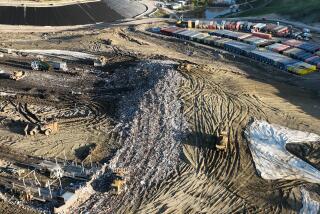AQMD Is Improved, Auditors Conclude : Environment: Study ordered by legislators finds that the district has cut its permit backlog and improved communications with businesses.
- Share via
An audit of the South Coast Air Quality Management District, ordered by the Legislature after complaints from business, has concluded that the smog agency has made “significant strides” in improving its operations, but called for further efforts to bolster its effectiveness.
The $172,000, six-month study by the management firm of KPMG Peat Marwick found that the district had reduced a backlog in issuing operating permits to businesses, slowed the growth of the agency and launched initiatives to improve communications with the business community. The study was made public Friday by the AQMD.
The district hailed the audit’s findings as a vindication of its efforts to combat air pollution in the face of strong resistance from business interests.
“I think the key point of this audit is the district isn’t this wild, out-of-control agency that is poorly administrating its programs. . . . (It’s) one of the most respected agencies in the world,” AQMD Executive Officer James M. Lents said at a press conference at district headquarters in Diamond Bar.
But business executives, while applauding improvements in the district’s management, said the changes might never have been made if critics had remained silent.
“I do think the district should be complimented for making management improvements,” Los Angeles Area Chamber of Commerce President Ray Remy said. “But I don’t think any of those things would have happened if there hadn’t been some fairly strident criticism.”
One of the biggest complaints from business over the past two years has been the dramatic growth in the AQMD’s annual budget, now $115-million. The audit found that spending by the district increased by nearly 200% over the past five years.
AQMD officials have said the budget hikes were needed to pay for extra programs mandated by Congress and the Legislature. But critics attributed the growth in part to poor management and the fact that the district, governed by a board whose 12 members are not elected by voters, could raise revenues almost with impunity.
Auditors projected that the district’s budget would increase no more than 23% over the next three years, while expenditures are expected to increase by 36% during the same period.
An estimated 65% of the district’s budget is raised by collecting permit fees from new businesses and businesses that want to change or expand operations. Those requiring AQMD permits range from large polluting oil refineries and power plants to barbecue restaurants and dry cleaners.
As for the permits backlog, Lents said the time needed for processing applications has been cut by 50% during the past six months. Now, he said, it takes an average of 45 days to process and issue a permit, and some permits take as little as 10 days.
The district managed to process fewer than half of the 46,893 permit applications it had pending during the 1990-91 and 1991-92 fiscal years.
More to Read
Inside the business of entertainment
The Wide Shot brings you news, analysis and insights on everything from streaming wars to production — and what it all means for the future.
You may occasionally receive promotional content from the Los Angeles Times.










